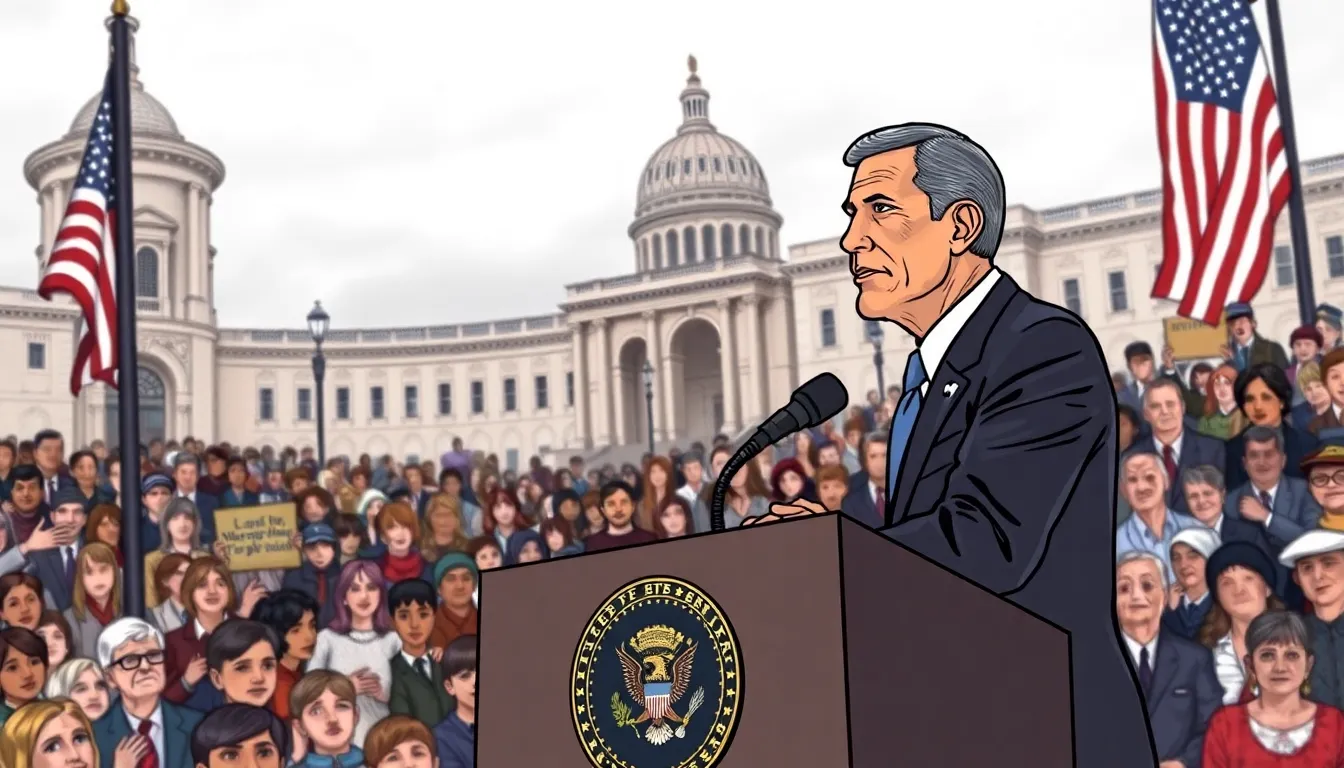Table of Contents
ToggleWhen it comes to the presidency, opinions can be as varied as the flavors of ice cream at your local parlor. But let’s face it: some presidents have left a bigger scoop on the national cone than others. From the Founding Fathers to modern-day leaders, the legacy of these individuals shapes the nation’s story. So who really deserves a spot in the presidential Hall of Fame?
Overview of Presidential Greatness
Assessing presidential greatness involves examining various factors. Leadership during critical periods shapes a president’s legacy. Policies that bring about significant social change often enhance a president’s standing. Historical context also plays a vital role in determining a president’s effectiveness.
Influence on both domestic and foreign affairs marks outstanding presidents. For instance, economic management during crises showcases a leader’s abilities. Engaging in diplomatic efforts can redefine a nation’s standing globally. Public perception often changes with time, influencing ongoing evaluations of greatness.
Ranking presidents typically considers their achievements and challenges. The effectiveness of civil rights legislation demonstrates tangible progress under certain administrations. War leadership, such as in the Civil War or World Wars, often elevates presidents’ reputations. In contrast, failures during their tenure can significantly lower their perceived value.
Contributions to democracy and freedoms often define notable leaders. Presidents who expand civil liberties leave lasting impacts. Implementation of major educational reforms may also highlight a president’s vision for the future. Ultimately, the assessment of greatness can vary based on individual values and societal changes.
Impact and significance resonate through political history. Regular surveys and polls assess public opinion on presidential effectiveness. Historians utilize various criteria to evaluate greatness, including moral leadership and crisis management. With evolving perspectives, the conversation about the best presidents continues dynamically.
Criteria for Ranking Presidents

Evaluating U.S. presidents involves several key criteria that highlight their influence and legacy.
Leadership Qualities
Strong leadership is essential in defining a president’s effectiveness. Charisma inspires confidence among constituents. Decision-making abilities during crises exhibit a president’s resolve. Integrity fosters public trust, enhancing a leader’s credibility. Communication skills engage the nation in crucial discussions. Emotional intelligence enables empathy and compassion. Resilience during challenging times reflects determination, ultimately shaping a president’s legacy.
Policy Impact
Significant policies often mark successful presidencies. Legislation promoting civil rights transforms societal norms. Economic reforms can stimulate growth and reduce inequality. Health care initiatives may expand access to vital services. Environmental protections address urgent climate challenges. Foreign policy strategies influence international relations and national security. Ultimately, lasting policies define a president’s impact long after their term ends.
Historical Context
Historical context shapes the evaluation of presidential greatness. Each era presents unique challenges and opportunities. Wars, recessions, and social movements impact decision-making processes. The cultural landscape influences public expectations and reactions. Changing societal values redefine what constitutes effective leadership over time. Examining these contexts reveals the nuances of each presidency, demonstrating how history informs assessments of greatness.
The 10 Best Presidents
This section highlights ten U.S. presidents recognized for their remarkable achievements and significant contributions to the nation. Each leader played a critical role in shaping the country’s trajectory.
President #1: Achievements and Contributions
George Washington led the nation from 1789 to 1797. He established key precedents for the presidency, such as the tradition of a two-term limit. Washington’s leadership during the Revolutionary War solidified his status as a unifying figure, earning him widespread respect and loyalty.
President #2: Achievements and Contributions
Abraham Lincoln served from 1861 to 1865 during a tumultuous time. His leadership in the Civil War preserved the Union and led to the abolition of slavery through the Emancipation Proclamation. Lincoln’s commitment to equality reshaped American society and continues to inspire for civil rights.
President #3: Achievements and Contributions
Theodore Roosevelt’s presidency spanned from 1901 to 1909. He championed progressive reforms, including trust-busting and consumer protection legislation. Roosevelt’s efforts to conserve natural resources laid the groundwork for future environmental movements.
President #4: Achievements and Contributions
Franklin D. Roosevelt’s four terms from 1933 to 1945 marked a transformative period. He initiated the New Deal, which addressed the Great Depression through extensive economic reforms and social safety nets. FDR’s leadership during World War II further solidified his legacy.
President #5: Achievements and Contributions
Harry S. Truman served from 1945 to 1953 following FDR’s death. His decision to use atomic bombs ended World War II, while his Truman Doctrine contained communism during the Cold War. Truman’s post-war policies helped shape modern U.S. foreign relations.
President #6: Achievements and Contributions
John F. Kennedy’s presidency lasted from 1961 to 1963. He is remembered for his inspirational vision, most notably articulated in the launch of the Peace Corps. Kennedy’s leadership also addressed civil rights and the Cuban Missile Crisis, showcasing his diplomatic skills.
President #7: Achievements and Contributions
Lyndon B. Johnson held office from 1963 to 1969 and significantly advanced civil rights legislation. His Great Society programs aimed to eradicate poverty and promote equality, leading to landmark laws like the Civil Rights Act of 1964. Johnson’s domestic agenda transformed social policies.
President #8: Achievements and Contributions
Ronald Reagan’s presidency, from 1981 to 1989, marked the resurgence of conservative ideals. His economic policies, known as Reaganomics, aimed to stimulate growth and reduce government intervention. Reagan’s foreign policy initiatives contributed to the end of the Cold War.
President #9: Achievements and Contributions
Bill Clinton served from 1993 to 2001, focusing on economic prosperity and welfare reform. His administration achieved a budget surplus and reduced unemployment. Clinton’s foreign policy initiatives included peace agreements in the Middle East and economic partnerships.
President #10: Achievements and Contributions
Barack Obama, president from 2009 to 2017, is known for the Affordable Care Act, which expanded healthcare access. His leadership emphasized diplomacy, with significant accomplishments like the Iran nuclear deal. Obama’s presidency marked historic shifts in social dynamics and equality.
The discussion around the best U.S. presidents reveals a rich tapestry of leadership that has shaped the nation. Each of the ten presidents highlighted made unique contributions that resonate through history. Their legacies reflect not just individual achievements but also the evolving values of American society.
As public perception shifts and new challenges arise, the evaluation of presidential greatness remains a dynamic conversation. The criteria for assessing these leaders will continue to adapt, ensuring that their impact is recognized and remembered. The ongoing exploration of their legacies serves as a reminder of the profound influence presidents hold in guiding the nation’s path.




